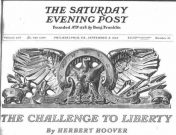By stifling religion and the communities that form around it, the courts undermine religion's capacity to house safely our natural drive for meaning.
Barack Obama, the Progressives, and the Presidency Unbound
He may be modeling his re-election efforts after those of Harry Truman in 1948, but entering the last year of his term, President Barack Obama is taking considerable efforts to also wrap himself and his presidency in the mantle of Theodore Roosevelt. The comparison is not without merit. His January 2012 recess appointment of Richard Cordray as the head of the new Consumer Protection Bureau, in fact, has its best precedents in the actions and constitutional theories of Roosevelt and the wider progressive era challenge to the Founding vision of America.
Though the Senate was taking the actions necessary to not be in recess during the Christmas break, Obama acted anyway to put in place a man whose appointment had been held up in the Senate for six months. Constitutionally questionable, his sidestepping of the Senate actually has roots in the progressive era actions and constitutional vision of Teddy Roosevelt.
This is how Obama justified his actions: “When Congress refuses to act, and as a result, hurts our economy and puts our people at risk, then I have an obligation as President to do what I can without them. I’ve got an obligation to act on behalf of the American people.”
Obama’s statement makes no mention of the Separation of Powers, Checks and Balances, or constitutional provisions granting power to our presidents. Stated simply, Obama’s argument amounts to a theoretically unbound presidential power to act at any time he finds it in the public’s interest–regardless of the constitutional role or powers of Congress. Obama’s rhetoric and actions are a striking affront to the basic underpinnings of our constitutional order. It should be noted, however, that they are similar to Roosevelt’s “stewardship theory” of presidential power advocated most clearly in his autobiography.
“I declined to adopt the view that what was imperatively necessary for the Nation could not be done by the President unless he could find some specific authorization to do it,” the former President wrote in 1913. Rather than starting from the basic foundational understanding that “We the People” granted certain limited powers to the institutions of the federal government and reserved the rest to ourselves or our states (which the 10th amendment makes so clear), Roosevelt assumes the provisions of the Constitution are only limiting. The consequences of this understanding are profound. Everything that is not explicitly forbidden becomes acceptable. The project of our Founders is overturned.
The American founders framed a Constitution that granted only certain powers to the presidency and carved out important roles and powers for the other institutions. Those institutions were set off against one another to force deliberation and cooperation. Everything else was left to the states or to the people. Any president who takes it to be his right or obligation to act whenever he finds the nation to need it, acts more like a Roman dictator than a republican chief magistrate.
In order to rebalance the constitutional order, Congress must remember the basic lessons of The Federalist Papers and act aggressively and in unison against such executive aggrandizement. Its not a partisan issue, but a constitutional issue that goes to the very heart of our limited constitutionalism. To paraphrase James Madison, Ambition must again be made to counteract ambition.



